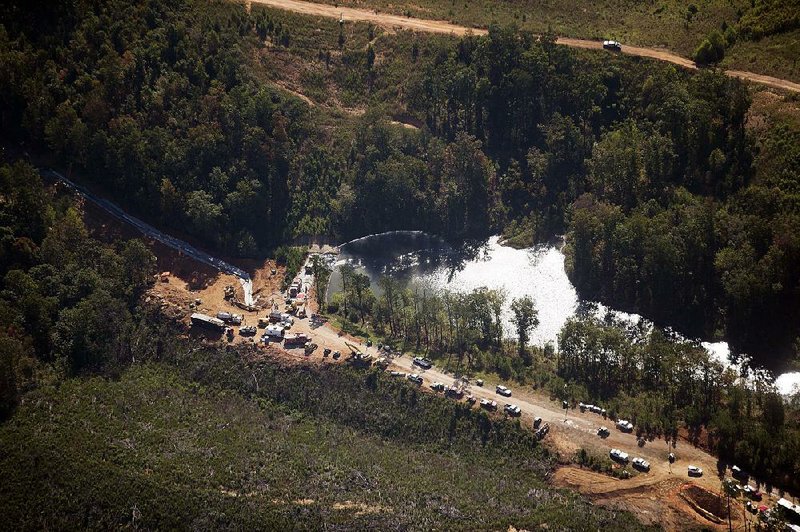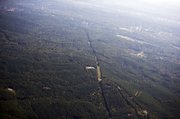ATLANTA -- The largest gasoline pipeline in the U.S. is set to restart its main shipping route today, easing almost two weeks of supply disruptions and surging fuel prices in the Southeast because of a leak in Alabama.
The roughly 500-foot section of pipe that will serve as a bypass was completed Tuesday, and Colonial Pipeline expects that will allow it to restart its main gasoline line, company spokesman Steve Baker said.
"[The] restart of the main gasoline line is a key milestone," Baker said. "However, it will take a few days for the fuel supply chain to fully recover."
The bypass was needed to move fuel around the leak of its main gasoline pipeline near Helena in Shelby County, Ala. The leak, which spilled between 252,000 gallons and 336,000 gallons of gasoline into a pond, was detected Sept. 9.
The leak has led to some gasoline shortages and higher prices at the pumps in several states.
On Tuesday, gas prices continued to climb in several Southern states, the auto club AAA reported.
In Georgia, Tuesday's average price for regular gas rose about 5 cents from Monday, to an average of $2.36 statewide -- up nearly 27 cents over the past week. Alabama, South Carolina, North Carolina, Tennessee and Virginia also saw prices climb since Monday, AAA reported Tuesday.
"We certainly expect the gas prices to increase, certainly while this line is under repair and not at full capacity," AAA spokesman Garrett Townsend said Monday.
In Alabama, Gov. Robert Bentley said gas prices in parts of the state rose 20 cents over the weekend after the pipeline leak, but added he didn't consider that price gouging.
"It changes overnight sometimes that much," he said.
Bentley toured Colonial Pipeline's emergency response center, in a luxury resort hotel about 12 miles from the pipeline breach, and spent much of a news conference Monday praising the company's response.
"It's amazing to see how quickly everybody has reacted," Bentley said.
A disaster drill was held last year near the scene of the spill, he said, and that helped the company plan and execute a response that has included about 700 people so far.
Federal and state mandates were lifted in response to the squeeze that led motorists to line up at supplied stations. Rules on fuel blending and hours that truckers can deliver fuel were waived, and a barge that normally moves gasoline to Florida was rerouted to supply markets in Georgia and South Carolina. Bentley urged Alabama residents to remain calm during the temporary shortage.
"I want people to first of all not panic," he said. "I think that right now with the state of emergency we're able to bring more fuel in if we need it by truck or barge."
In Georgia, Gov. Nathan Deal issued an executive order Monday aimed at preventing price gouging.
"There have been recent reports that wholesale and retail gas prices have substantially increased in some markets," he said.
According to a preliminary report, it wasn't possible to immediately pinpoint the leak, partly because highly flammable benzene and gasoline vapors hung in the air for more than three days, preventing firefighters, company officials and anyone else from being near the site.
State workers discovered the leak when they noticed a strong gasoline odor and sheen on a man-made retention pond, along with dead vegetation nearby, the Pipeline and Hazardous Materials Safety Administration said in the report.
The report does not identify the cause of the leak. The agency, part of the U.S. Department of Transportation, is investigating the leak in a section of the pipeline constructed in 1963, it said.
Colonial Pipeline Co., based in Alpharetta, Ga., was formed in the 1960s by oil companies to transport their product along the Eastern Seaboard. It now operates 5,599 miles of pipelines, transporting daily more than 100 million gallons of gasoline, jet fuel, home-heating oil and other hazardous liquids in 13 states and the District of Columbia, according to company filings.
The pipe that failed is one of two Colonial lines connecting dozens of refineries in Texas and Louisiana with cities from Atlanta to New York. Usually running at full capacity, it provides nearly 40 percent of the Southeast and East Coast region's gasoline.
The Environmental Protection Agency fined Colonial $34 million in 2003 for gross negligence -- at the time the largest civil penalty in EPA history -- after it spilled almost 1 million gallons of diesel in South Carolina, polluting waterways in four states. The company also agreed to spend $30 million to upgrade environmental protections on its pipeline system.
Since 2006, the company has reported 178 spills and other incidents that released a combined 193,000 gallons of hazardous liquids and caused $39 million in property damage. Most were caused by problems with materials, welding or some other equipment failure, according to federal records.
Information for this article was contributed by Jeff Martin, Shameka Dudley-Lowe, Kate Brumback, Kathleen Foody, Alex Sanz, Jay Reeves and Bruce Smith of The Associated Press and by Laura Blewitt and Barbara Powell of Bloomberg News.
A Section on 09/21/2016

